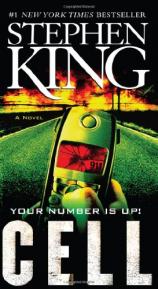Cell
Review
Cell
For a guy who was planning to take a break from publishing, Stephen King sure has been busy. His "break" lasted all of fifteen minutes. It included FAITHFUL, a fine book about the 2004 Boston Red Sox, co-written with Stewart O' Nan; THE COLORADO KID, a deceptively low-key work that may be the penultimate mystery novel; and now CELL, the topic of this discussion. If MISERY was --- as King indicated --- a love letter to his fans, then CELL is arguably the bouquet of roses, the one in which the nest of spiders lies waiting, venomously and patiently.
CELL had little advance fanfare; I had read that it was "old school King," but how many times have we heard that line before? In the case of CELL, however, it's true. If you have a Stephen King bookcase you'll want to put this one on the shelf next to THE STAND, SALEM'S LOT and THE SHINING (to name but a few). It will scare the daylights out of you, give you nightmares, and make you check the kids at night. Above all, you're definitely going to hesitate before answering that cell phone of yours.
The "cell" of the title refers to cellular phones. In this case, cell phones are the instruments by which civilization as we know it dries up and blows away within 24 hours. CELL jumps right out of the gate with carnage and brutality, all based on a singular premise: on and after a particular moment, which becomes known as "The Pulse," everyone talking on a cell phone gets their brain fried.
Readers get to see what happens in Boston through the eyes of Clay Riddell, an aspiring comic book artist from Maine who has just made the deal of his life. One minute people are feeding ducks, buying ice cream, driving to and fro; they all, of course, are talking on cell phones while doing so. The next minute the "phoners" are mindlessly tearing each other apart. Riddell, who is unaffected, concludes through the process of empirical observation that cell phones are the culprit. He doesn't own one, wasn't using one, and isn't about to start, especially now. Riddell wants to return home to Maine to check on the well-being of his estranged wife and their 12-year-old son. His wife would never own a cell phone, but their son does. Riddell is driven to discover their fate at all costs, notwithstanding a few million rampaging, bloodthirsty phoners between Massachusetts and Maine.
With a small and somewhat unlikely group of folks who were not on cell phones when The Pulse first hit, Riddell begins a long and extremely dangerous journey on foot back to home base. And, as if they weren't lethal enough, the phoners are changing --- and this change is not for the good.
King dedicates CELL to Richard Matheson (I AM LEGEND) and George Romero (NIGHT OF THE LIVING DEAD). The reason is manifestly obvious from the book's opening pages --- but this is much more than a zombie novel. King turns that particular genre inside out and upside down, evolving it as surely as he evolves the phoners. There are also references to King's Dark Tower saga, both subtle (I'm not telling) and speculative (is The Pulse the disaster that turned Roland's world upside down?), but if you haven't read a word of The Dark Tower you'll still appreciate and love CELL from beginning to end. You just won't do it over a meal at your local Steak 'n' Shake.
Reviewed by Joe Hartlaub on November 21, 2006





